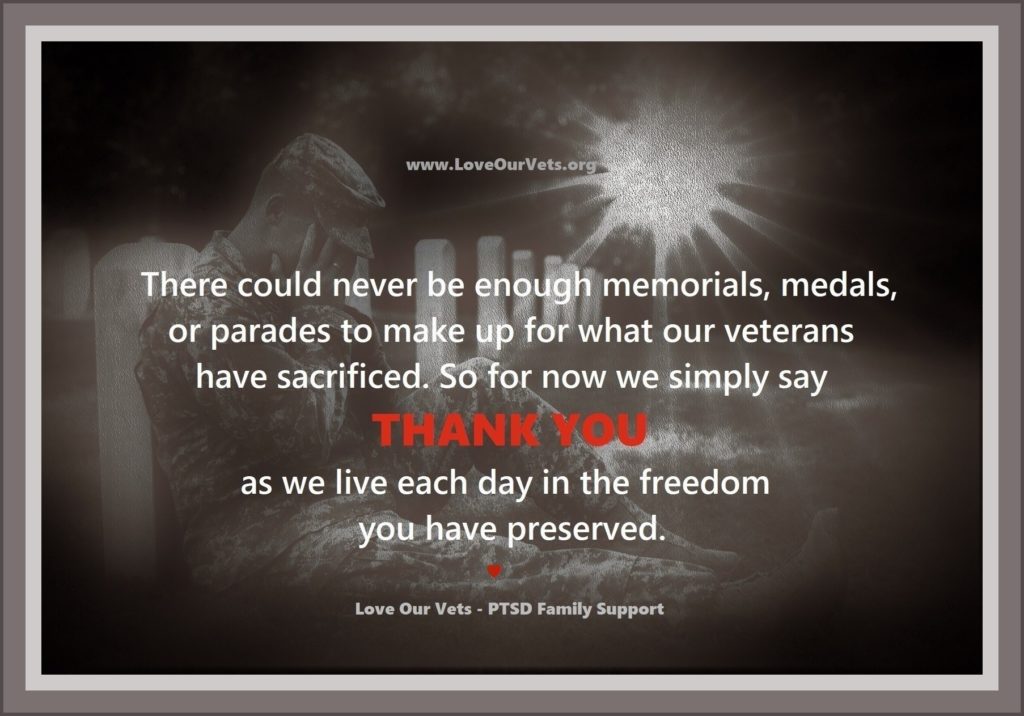(Chosen as Editor’s Pick on CP Blogs) More than just another day off and the segue into summer, Memorial Day and other patriotic holidays are a time for reflecting, supporting and giving thanks for the sacrifices our heroes have made for us. However, what looks like a three-day-long weekend of fun, parties and picnics to some, looks like a nightmare to others. What most people don’t realize is that many of our honored veterans of all ages will continue to sacrifice and struggle for the rest of their lives with the invisible wounds of PTSD.
As many of us know, patriotic holidays can trigger PTSD symptoms in the same way as trauma anniversaries. As I share in the book LOVE OUR VETS: Restoring Hope for Families of Veterans with PTSD, even if our vets don’t realize it, these holidays stir up feelings that may aggravate symptoms of posttraumatic stress. For some, these dates and their nightmarish memories are clear, horrific and devastating. For others, there’s a gloomy fog hanging over them that they just can’t identify. And many of our beloved veterans are plagued with survivor’s guilt – the haunting question of why did I come back alive? These feelings wreak havoc for both the vet and all those around them. Including you and me.
We who love our vets can be on the lookout for escalated symptoms such as outbursts of anger, depression, intense anxiety, substance abuse, increased nightmares, and suicidal thoughts. For some, these heightened symptoms may last a day, while for others it could last for months. And, a familiar pattern may or may not emerge each year. As nice as it would be, there is really no way to predict when our vets may be triggered. Sometimes they themselves are not even aware of what took place back then, but they react anyway. It seems as though the body remembers even what the brain has blocked out.
But there is hope. For those of us who know or love a veteran or service member who struggles with PTSD, the best thing we can do is to care. Listen. Ask questions. When was the last time you sat down with them and encouraged them to share their memories, significant events and experiences, and what they are going through right now? Keep in mind that this journey into the sequestered recesses of our veteran’s mind may set off a trigger or affect their mood, but that’s okay. And be sure to respect their space if they’re not ready to talk. Don’t be afraid if it feels awkward, difficult or painful. Love and support go a very long way!
Love and support go a very long way!
The more we can care for and connect with our vets, the more fulfilled they will be AND we will be. By writing down any trauma dates to remember in the future, and letting your vet know that you are there with them as the hard days come and go, you both will be able to better cope with tough holidays and trauma anniversaries. And it might not be a bad idea for some of our vets to totally avoid activities, people and places that trigger them or stir up the negative.
I remind myself that we cannot fix the PTSD. It is not our job to fix. (Sigh of relief!) Instead we need to be cognizant of our own downward pull during these times. Take care of ourselves and our needs. Consider connecting with others in a peer support group locally or online…truly a lifeline! It is also a help to remember that the dates do pass.
Whether you decide to take a quiet weekend away or to join in the local parade, let your veteran know how much you support them, appreciate them, and love them.
And although Memorial Day is set aside primarily to honor those who died in service for our country, we can honor all who have served. And we must also remember with heartfelt compassion those Gold Star families who have lost their beloved Warriors. There could never be enough medals, parades or memorials to make up for what our Warriors have sacrificed. So the least we can do is honor them, and never take our freedoms for granted.







